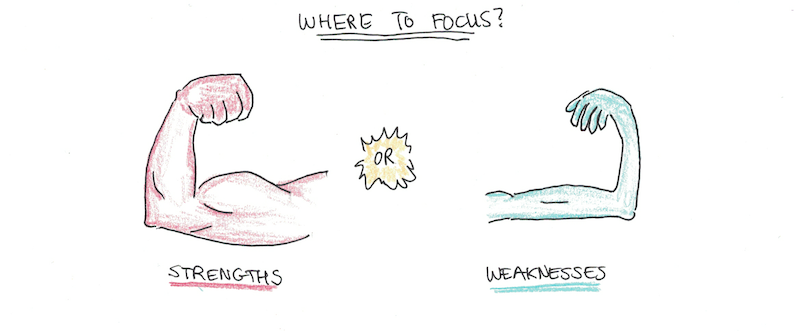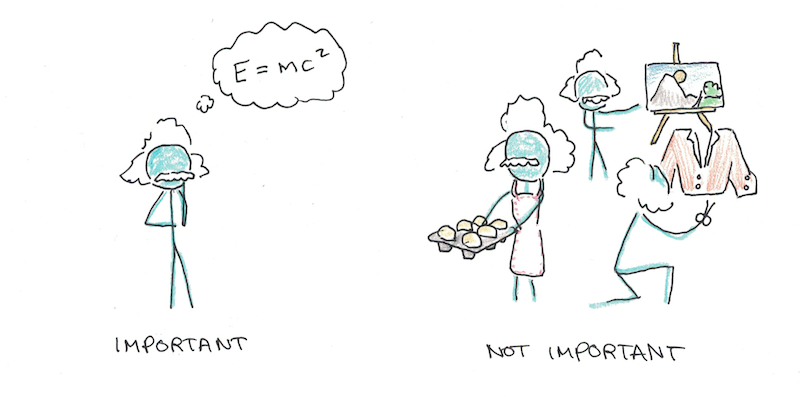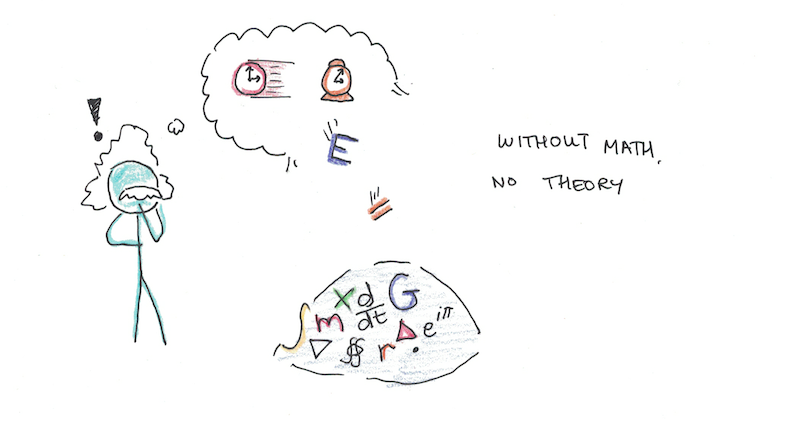Say you only have time to focus on improving one thing in your life right now, what should you focus on: something you’re good at or an area you’re weak?

Most people will argue that you should focus on your strengths. With books like Strengths Based Leadership and Now, Discover Your Strengths, authors have made a living out of arguing that we should give up trying to fix our flaws and double down on what makes us great.
There’s just one problem with this advice: it often doesn’t work!
This isn’t just because life is complicated and every situation calls for a unique response. Instead, I think the dividing line between whether something is a weakness you should work on or ignore is actually fairly clear and simple.
When You Should Focus on Your Strengths
The logic behind focusing on your strengths is one of specialization and increasing returns to mastery.
Albert Einstein didn’t need to be a good painter, baker or tailor. He could enjoy art, eat cookies and wear suits all made by somebody else. Spending more time trying to improve his pastry-making skills would have robbed him of precious hours to develop general relativity.
Similarly, the value of Einstein’s science came from breakthrougths at the edge of human knowledge. Had he only gotten halfway to the frontier of his day, that wouldn’t be useful. Either you develop new science, or you don’t.

This illustrates the central case for focusing on strengths:
- Specialization is possible. Einstein’s muffin baking can be safely ignored.
- Mastery matters. Einstein’s success depended on being the best physicist, not merely a mediocre one.
When You Should Focus on Your Weaknesses
The logic behind fixing your weaknesses is one of bottlenecks and inescapable elements.
Suppose, for instance, that Albert Einstein, brilliant visualizer and imaginative thinker he was, couldn’t do math. In contrast to his lack of baking talent, this indeed would be a major failure. For it wasn’t merely thought experiments that led to his success in science, but turning those thought experiments into math that others could put to the test.
The math behind general relativity, for instance, was so fearsome that it took Einstein years to wrap his mind around it. His biographer even argues he developed stomach problems due to the stress. Yet, the math was inescapable. It had to be done or the work didn’t count.

Einstein can’t outsource “doing the math” to someone else because it is intrinsically tied up in his work as a physicist. Similarly, he can’t outsource “communicating his idea” as how would he be able to do it?
This illustrates the central case for fixing weaknesses:
- Separation is impossible. Einstein can’t get someone else to do the math.
- Weaknesses worsen the whole. If Einstein’s math is bad, the theory will be bad. Failure in one will undermine the entire enterprise.
The Dividing Line Between Fixing and Ignoring Weaknesses
With these two paradigmatic cases in mind, let’s walk through a few questions you can ask yourself to decide if you should fix your weaknesses or focus only on your strengths:
1. Can You Outsource Your Weakness?

Is it possible to get somebody else to work on your weak point? If you can hire, delegate, purchase or abstract away the thing you’re not as good at, this is often a better solution than trying to fix weaknesses.
2. Can You Ignore/Downplay Your Weakness?

Even if a weakness can’t be outsourced, it can safely be ignored. If you’re a writer who isn’t very funny, you don’t need to be comedic in your prose. If you’re bad at math, you can avoid making your career rest on numerical virtuosity.
3. Do You Want to Improve Your Weakness?

Sometimes a weakness is merely an undiscovered strength. It’s often through lack of practice, rather than genuine lack of talent, that our weaknesses hobble us. Therefore, if you actually want to improve your weakness, that might be the best sign to work on it more than anything else.
Of course, the opposite is also true. If you hate working on your weakness, and you more motivated to tackle something you’re great at, that may be a better path to follow. Whether those weaknesses can or should be ignored matters, but perhaps even more is whether you have the will to fix them.


 I'm a Wall Street Journal bestselling author, podcast host, computer programmer and an avid reader. Since 2006, I've published weekly essays on this website to help people like you learn and think better. My work has been featured in The New York Times, BBC, TEDx, Pocket, Business Insider and more. I don't promise I have all the answers, just a place to start.
I'm a Wall Street Journal bestselling author, podcast host, computer programmer and an avid reader. Since 2006, I've published weekly essays on this website to help people like you learn and think better. My work has been featured in The New York Times, BBC, TEDx, Pocket, Business Insider and more. I don't promise I have all the answers, just a place to start.